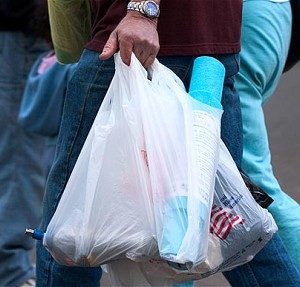From coast to coast, the coronavirus is claiming yet another unexpected victim: reusable shopping bags.
On Friday, the mayor of Kent, Washington, ordered her city to stop enforcing its single-use plastic bag ban. “This suspension of the enforcement of this ordinance will last until Mayor [Dana] Ralph withdraws the declaration of the state of emergency,” read a post on the mayor’s Facebook page.
The next night and on the opposite coast, New Hampshire Gov. Chris Sununu went even further, issuing an executive order requiring grocery stores and other retailers to “temporarily transition to use of single-use paper or plastic bags” and away from reusable shopping bags.
“Our grocery store workers are on the front lines of COVID-19, working around the clock to keep New Hampshire families fed,” Sununu said. “With identified community transmission, it is important that shoppers keep their reusable bags at home given the potential risk to baggers, grocers and customers.
“This Emergency Order directs all grocers and retail stores in the state to temporarily transition to only use new paper or plastic grocery bags provided by stores as soon as feasibly possible.”
In New York, State Sen. John Flanagan is calling for the state’s plastic-bag ban to be suspended, while Waterville, Maine Mayor Nick Isgro wants to ban reusable shopping bags for 60 days.
“Whether it’s coronavirus that gets transferred or something else, we know scientifically these things are laden with germs because a lot of people just don’t clean them,” Isgro said.
And both Starbucks and Dunkin’ are refusing to serve customers using their reusable coffee cups as well, cups the companies spent millions in marketing to promote.
After years of anti-plastic activism, the risks from the coronavirus outbreak have put single-use plastics back on top.
Sununu’s decision came soon after the free-market Josiah Barlett Center (JBC) released a report laying out available data connecting reusable cloth and vinyl bags and reusable water bottles with increased risks of spreading germs and, potentially, the coronavirus.
The New Hampshire-based think tank reports multiple studies showing “reusable grocery bags have been shown to pose genuine health risks.”
The Bartlett Center linked a 2018 study by the Loma Linda University School of Public Health using a non-toxic norovirus surrogate sprayed on reusable shopping bags in a grocery store. “They found the virus surrogate everywhere — on food packages, fresh produce, cart handles, checkout touch screens and checkout clerks,” the JBC reported.
And a 2012 study of San Francisco’s plastic bag ban found the city experienced a 25 percent increase in bacteria-related emergency room visits relative to neighboring counties that did not ban plastic bags.
“Ill-conceived bans on disposable containers such as plastic shopping bags, water bottles, to-go-cups, and straws need to be reconsidered along with the many other unnecessary and potentially dangerous regulations this outbreak is exposing,” Andrew Cline, the JBC’s executive director, told InsideSources.
“Research clearly shows that poorly-handled reusable shopping bags are like little Ubers for dangerous microorganisms. Gov. Sununu deserves credit for taking this public health risk seriously when other state and local elected officials would not.”
Some environmentalists are pushing back, arguing the risk of catching coronavirus from reusable shopping bags or coffee cups is less significant than the risks from global warming.
“We cannot forget and disregard the other big current challenges we are also currently facing,” Larissa Copello de Souza of Zero Waste Europe told the Wall Street Journal, citing climate change, waste and plastic production. “Promoting the use of reusables is certainly one of the greatest practices we have to address those issues.”
Setting aside the fact that multiple studies show reusables are responsible for more greenhouse gas emissions than single-use plastics, the ethos of the moment is that stopping coronavirus and protecting people from exposure are today’s top priority. And grocery store workers dealing with the rush of desperate customers looking for milk, bread and toilet paper are at particular risk.
“I heard from workers at the store who brought the concern directly to me and we acted quickly,” Sununu told InsideSources. “So far it seems very well received.”

